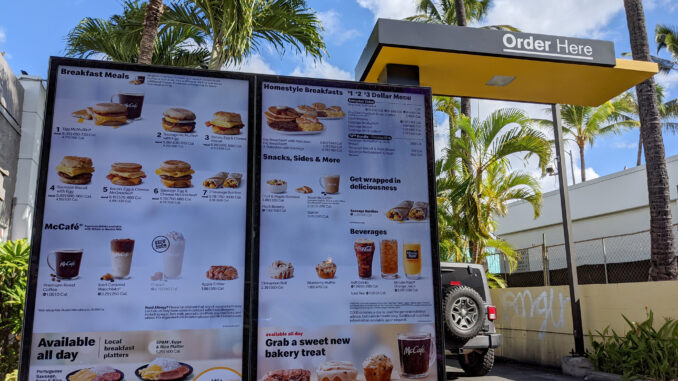
By Lea Mira, RTN staff writer - 6.14.2024
It seems that the anticipated wave of job losses due to generative AI has not yet materialized in the restaurant industry, as evidenced by McDonald’s recent decision to discontinue its AI order-taking technology. The fast-food giant announced that it is removing the AI system from over 100 drive-thrus, concluding a test period conducted in partnership with IBM.
McDonald’s spokesperson confirmed the decision to Business Insider, noting that the technology was introduced to customers in 2021 following a global partnership with IBM. Under this partnership, IBM acquired McD Tech Labs, which McDonald’s had established after acquiring AI speech company Apprente in 2019.
The collaboration aimed to develop and deploy an automated voice ordering solution to simplify operations for crew members and enhance the customer experience. However, the technology’s performance fell short of expectations. McDonald’s CEO Chris Kempczinski told CNBC in June 2021 that the voice recognition system was accurate about 85% of the time, necessitating human intervention for approximately one in five orders.
The shortcomings of the AI system did not go unnoticed. Videos of customers struggling with the Automated Order Taker (AOT) gained traction on social media platforms like TikTok. One video showed a woman attempting to order water and vanilla ice cream, only to have the AI system add four ketchup packets and three butter packets to her order. Another video featured a customer who ordered one large cup of sweet iced tea but received nine cups instead.
Despite these issues, McDonald’s remains optimistic about the future of AI in its operations. “As we move forward, our work with IBM has given us the confidence that a voice ordering solution for drive-thru will be part of our restaurants’ future,” a McDonald’s spokesperson told Business Insider. “We see tremendous opportunity in advancing our restaurant technology and will continue to evaluate long-term, scalable solutions that will help us make an informed decision on a future voice ordering solution by the end of the year.”
IBM echoed this sentiment, expressing its commitment to continue working with McDonald’s on other projects. “This technology is proven to have some of the most comprehensive capabilities in the industry, fast and accurate in some of the most demanding conditions,” IBM said. “While McDonald’s is reevaluating and refining its plans for AOT, we look forward to continuing to work with them on a variety of other projects.”
The decision to end the test without expansion was communicated to franchisees via email. Mason Smoot, Chief Restaurant Officer for McDonald’s USA, stated, “While there have been successes to date, we feel there is an opportunity to explore voice ordering solutions more broadly. After a thoughtful review, McDonald’s has decided to end our current partnership with IBM on AOT, and the technology will be shut off in all restaurants currently testing it no later than July 26, 2024.”
McDonald’s began experimenting with AI technology as early as 2019, installing 700 AI-powered menu boards featuring automated suggestive selling. The company has taken a cautious approach to drive-thru AI, even as other chains like Checkers and Rally’s, Hardee’s, Carl’s Jr., Krystal, Wendy’s, Dunkin, and Taco John’s have either tested or implemented similar technologies.
The goal for these companies is to automate order-taking, potentially reducing the need for human employees or allowing staff to focus on other tasks. However, concerns about order accuracy and customer satisfaction have raised questions about whether the technology is ready for widespread adoption.
McDonald’s decision to end its partnership with IBM on AOT does not signify a complete abandonment of AI in its drive-thrus. “IBM has given us confidence that a voice ordering solution for drive-thru will be part of our restaurant’s future, and we want to sincerely thank IBM and the restaurant teams that have been part of this crucial test,” Smoot said.
As McDonald’s continues to explore technological advancements, the company remains committed to finding scalable solutions that enhance both operational efficiency and the customer experience. The end of this particular test marks a pause rather than a full stop in McDonald’s journey toward integrating AI into its operations.

